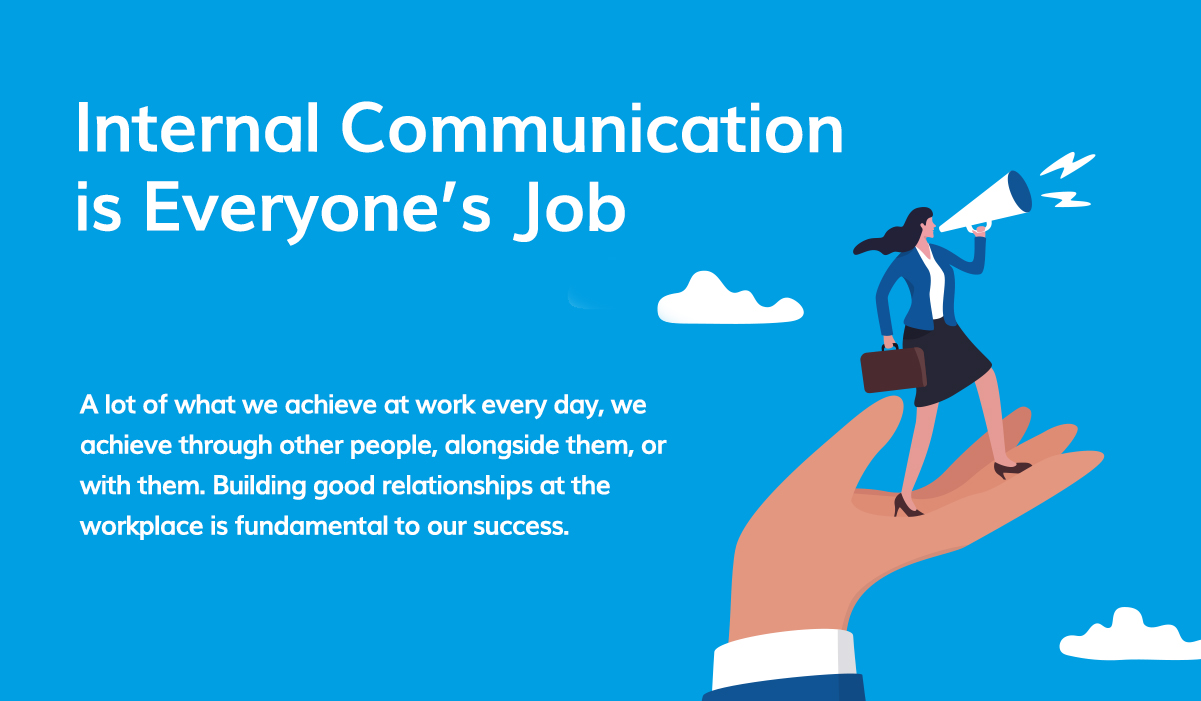It’s no secret that a solid internal communications strategy is the bedrock of successful, high-achieving teams. It is worth noting, however, that effective internal communication doesn’t only come from the leaders, or from internal communication strategists. Internal communication is more fundamental than that. In fact, it should be everyone’s job.
A lot of what we achieve at work every day, we achieve through other people, alongside them, or with them. Building good relationships in the workplace is fundamental to our success. Practising this skill will form your relationships and pave your way to success. When you think of internal communication, you may think of Slack messages, staff newsletters, or “whatever the comms team does”. Of course, that is part of it, but only part of it. It is reductionist and limiting to think of internal communications as someone else’s job. If you think in that way, it will also be improbable that you are open to learning more about it. It is less about the official (newsletters, company-wide emails, and memos) and more about relationships, loyalty, trust, shared knowledge, engagement, and motivation.
It begins with leadership.
Whilst the HR department and managers may communicate with employees on a day-to-day basis, your workforce still expects the manager/leader to communicate with them. If newsletters and companywide emails and/or meetings are the only way you’re communicating with your employees, you may seem detached. Everyone wants to feel heard and appreciated. Your employees need to see you and they need to feel visible too. Transparency, accessibility, and visibility are crucial.
What can YOU do as an employee?
By default, as an employee, you are your company’s advocate. What employees of an organisation say about the company has more weight than any other advertising a company is paying for. It is invaluable. That’s why organisational reputation is built from within.
As an employee, what can you do to encourage a culture of successful workplace communication?
Be honest.
Easier said than done, of course. Do you feel like you’re getting support, or are you feeling left behind? Communicate with your manager about the projects you love working on and what you need more support on. It is within your remit to initiate honest conversations with your manager or superior about your work. From the get-go establish a communication system with your manager that works for both of you. It may take some time to calibrate and get it right. You may want to explore some project management apps or find a routine for weekly meetings. Test and tweak as necessary. Take ownership of the system, and if your boss cancels a meeting, be the one to reschedule. Be persistent about it.
Always analyse what worked and what didn’t.
At the end of a project or a task, particularly one that required the input of a good number of members within your team, do a “post-mortem” analysis. What worked well, and what didn’t? Ask your coworkers for honest feedback. Take notes and share them with the rest of the team. This will help you get it right (or better) the next time around. Be the champion of communication.
Boundaries are important too.
As much as it is important to work alongside your team members, schedule time alone to be able to focus on projects that need more attention from you. Schedule independent work time and be clear about this need with your colleagues.
Share the love.
Found a great article that will help your team (hint: this one?), share it with the rest of the team. Came across a great book? Share that too. Don’t gatekeep… especially things that will help your team. Don’t hesitate to share links and apps that will help your team stay informed and on goal.
Chances are the more open the lines of communication are, the stronger your team will be and the more engaged you will be at work… and the more you’ll enjoy your time at work. Everyone loves a positive work environment and the change starts with you!
Share this article with your colleagues.


